Marketing BS Weekly Briefing: Open vs Closed Door, Dashboards, Hugh Jackman, Wikipedia tourism and more
What Third Way CMOs need to know this week
No follow-ups yesterday’s CRO essay, but three links building on last week’s dive into remote work and productivity. If you have any content you think is worth sharing with the Marketing BS audience, please let me know and I may include it next week.
Followups/Meta
Stripe: Stripe employees who chose to switch to remote work will get a one-time bonus, followed by a pay cut. This likely matches value creation: Short term productivity increase, followed by long term decline.
Open vs Closed door: Old (1986) essay from J. F. Kaiser on the impact of remote work before people were actually able to work remotely: “I notice that if you have the door to your office closed, you get more work done today and tomorrow, and you are more productive than most. But 10 years later somehow you don’t know quite know what problems are worth working on; all the hard work you do is sort of tangential in importance. He who works with the door open gets all kinds of interruptions, but he also occasionally gets clues as to what the world is and what might be important. Now I cannot prove the cause and effect sequence because you might say, “The closed door is symbolic of a closed mind.” I don’t know. But I can say there is a pretty good correlation between those who work with the doors open and those who ultimately do important things, although people who work with doors closed often work harder. Somehow they seem to work on slightly the wrong thing - not much, but enough that they miss fame.”
Remote Salary Arbitrage: From a Marketing BS reader. Remote salary arbitrage and why he believes it won't end well for employees. I think there are a lot of moving parts in this discussion. We will find many jobs, especially “creative” jobs (in the broadest sense) can be done remotely, but at much worse quality levels. Many “repeatable” jobs or “individualized” jobs - even if high skill - can be pushed remote and actually see productivity increase. And fully remote jobs can, in theory, be pushed to the lowest priced workforce. But in practice there is a difference between remote on the other side of the world with English as a second language, and remote in the same time zone within a direct flight when needed. Really hard to predict how it all nets out in a decade or two.
News
TikTok: When you get back from vacation getting through thousands of emails can sometimes be very fast. Instead of dealing with all the stuff that happened while you were gone, you can just deal with “where things are now”. If you have not been following the day-by-day changes in the TikTok saga, consider yourself lucky. The current status is that Trump has given approval for TikTok to operate in the US. Bytedance will maintain control over TikTok global, but sell some shares to Oracle and Walmart. If you count the American investors in Bytedance and DON’T COUNT the foreign investors in Oracle/Walmart/US PE firms, then "Americans" will own 51% of TikTok (but 100% of control is still based in China). The algorithm - where the real concern should lie - is still in the CPC's control. A big Trump donor (Larry Ellison) got a good deal on a TikTok equity stake and a large cloud computing contract. The rule of law has taken a big hit for no clear gain. As I said last week, "the worse of all possible worlds" Links: WSJ coverage. Bytedance’s explanation (translated). Rationale for Walmart’s investment (I agree with this).
Facebook VR/AR: The new Oculus has been announced. But more importantly, Facebook is clearly betting big on AR, and VR games are just their entry point. Mark still doesn’t think the tech is good enough for a real product - he thinks we need over-lays instead of just difficult to read text. Apple is developing products and waiting in the wings here too. I think AR will be mind-blowing when it is ready. But lots of smart people think it might just be the next Echo rather than the next iPhone
Facebook Whistleblower: Sophie Zhang, a junior data scientist at Facebook was fired in August, and sent a “6,600 word post” to the entire company on her way out the door. Zhang was on a Facebook team dedicated to rooting out “inauthentic activity”. It seems she often found examples of this behavior that were outside her responsibilities and she speculates she may have been fired for “neglecting her routine duties” to focus other activity she found objectionable. This feels like a classic big-company situation. Junior person sees an issue and wants to fix it, but can’t get the attention of senior management, so tries to fix it on her own, but drops the ball on her core job. It becomes news because of (ironically) the ability of social media to spread the story which allows it to be picked up by the NYTs. Her complaint is not that Facebook is not focused on abuse, it is that Facebook has not prioritized the particular abuse she identified and thought they should focus on.
Amazon: Amazon Music will now have podcasts - including exclusive podcasts. Unclear how do they compete in this space? Linkage to Echo speakers? But the Echo experience with podcasts right now is terrible. More likely this is just a “good enough” add-on. They will compete with Spotify the way Prime Video competes with Netflix - a nice extra to make free shipping a little stickier
Marketing/Advertising
Ad of the week: Ryan Reynold's narrates ad for Hugh Jackman's coffee. The ad is good, but it also used Reynold’s social media channels to push distribution (>2MM views on his YouTube channel so far). Lots of media coverage as well. This is Augmented PR at work. Related: “The Truce” ad from Jan 2019.
Traditional Television: Still dropping at over 10%/year among young people. Smaller decline among older demographics. But notice even the least engaged demographic is still watching over an hour a day. This is from Q1 (Mostly pre-COVID).
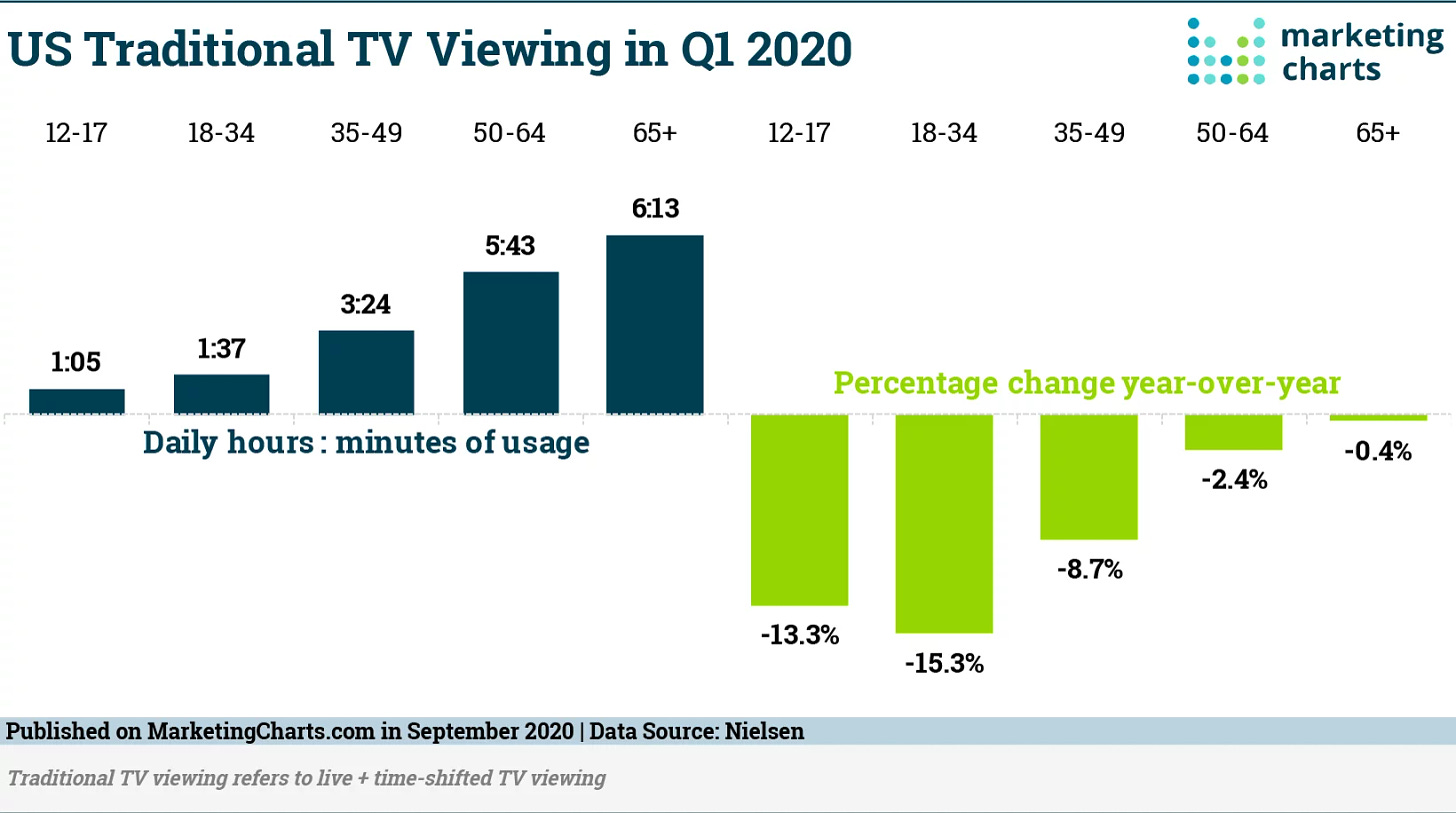
eCommerce: Traffic sources. Having a brand is REALLY important, then you need to get good at search.
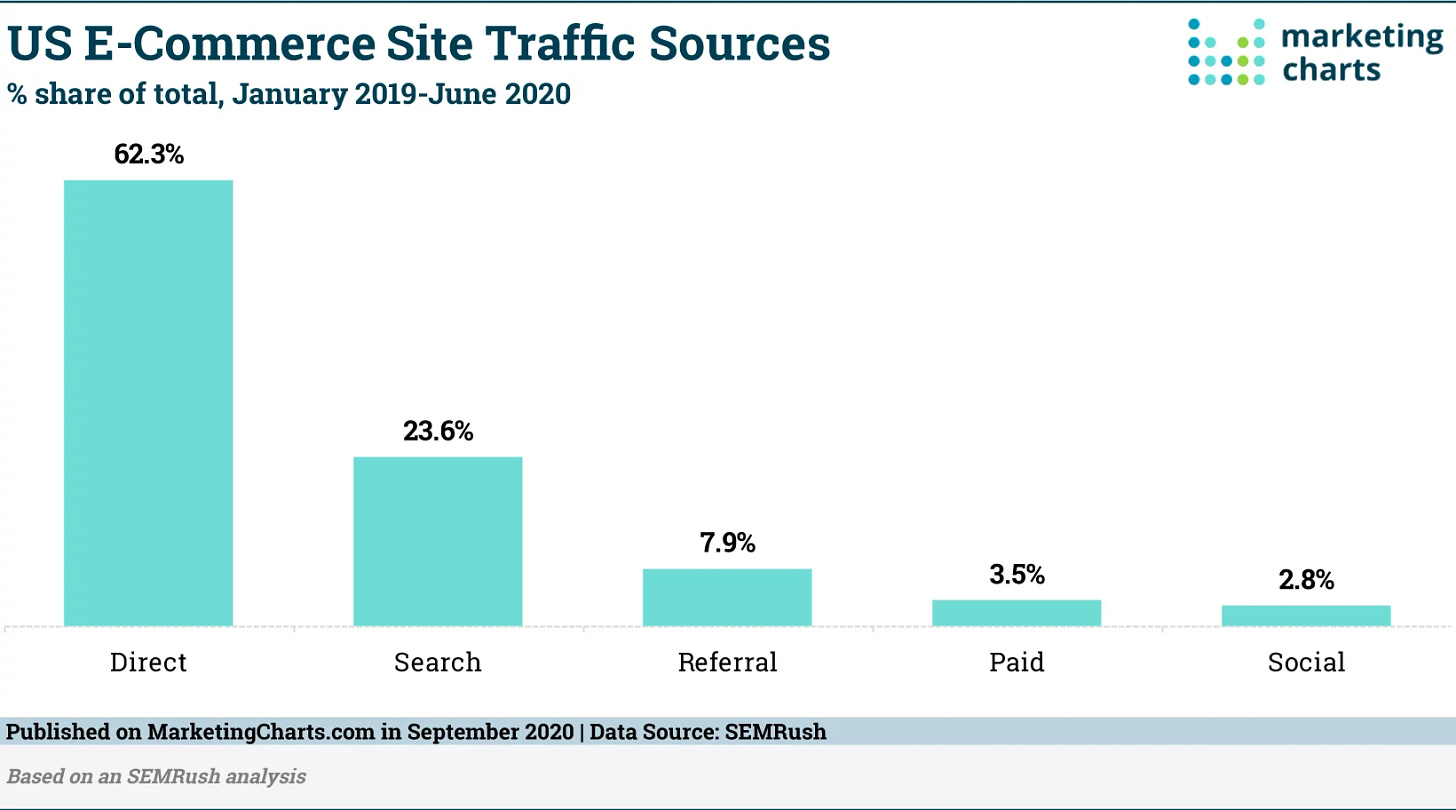
CBS AllAccess: The streaming service rebrands as Paramount+. Usually re-brands are a terrible idea, but I like this one. It replaces a meaningless "new" brand with an old brand that has a lot more recognition and value associated with it.
Google: As discussed in previous briefings, Google has removed the ability to see many “long tail” keywords in paid search accounts. We now have some estimates on how many KWs are no longer visibly shared - ~28%(!)
Podcast Advertising: Inside Audio summarized Veritone’s podcast advertising “uplift study”. Findings: “Live reads” outperform by recorded spots by 2x; Shorter spots (<10s) outperform longer spots by 4x; and Tue/Thr ads outperform Mon/Wed ads. I want to believe the live read conclusion, but the rest of the findings make me skeptical. I don’t believe this quote at all: “Shorter ads increase brand recall and ensure that listeners capture all necessary information in the spot, especially the web call to action”. And the Mon/Wed data is clearly noise.
Social Media and Politics: Wired has a story on how political campaigns test slogans, and then ask influential supporters to push the ones that seem to have traction. This technique pre-dates social media (i.e., door-to-door canvasing or telemarketing with talking points), but social media has accelerated the strategic possibilities and capabilities.
Wikipedia: Great study showing that when researchers added more content to the Wikipedia pages of small European cities the result was increased tourism. Adding an image and two paragraphs of text (largely just translated from the native language Wikipedia site) resulted in +9% increase in “tourist night visits”. There is a “good enough” component here as well, “The impact is largely driven by improvements to shorter and relatively incomplete pages”. The cities with the least content prior to the treatment saw a +33% lift, and the cities with well developed pages saw no lift at all. How much time have you spent making your Wikipedia page strong and accurate?
SEO: Top technical SEO mistakes. Almost every site is missing a lot of this basic stuff, and fixing it generally results in a bump within a few weeks (unlike other SEO investment that sometimes has a very slow payoff)
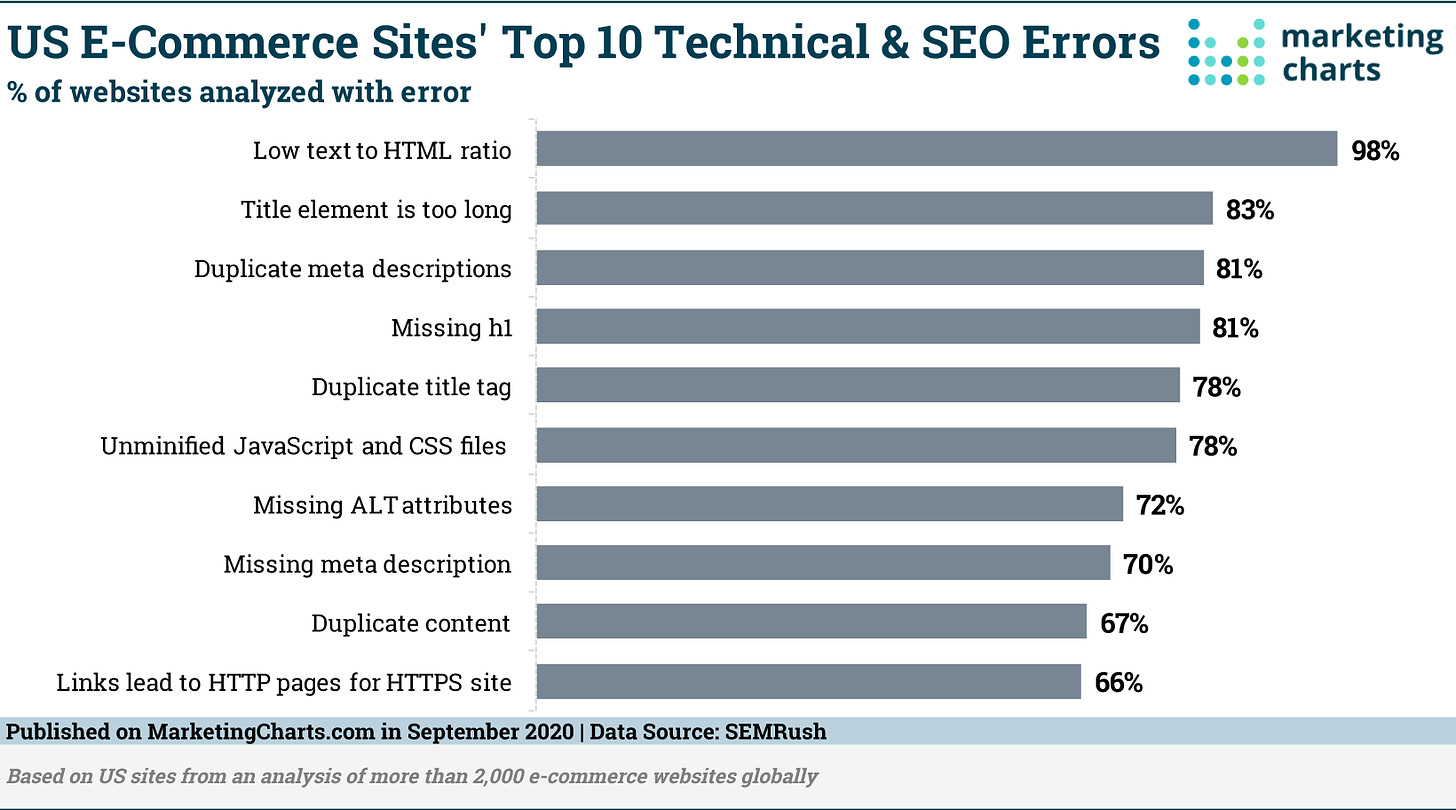
Business/Strategy
Marketing to Employees: Spotify has deleted many of Joe Rogan old (problematic) episodes. Fans are mad. But as regular readers know, consumers generally don't matter.... The bigger issue is what employees think, and they are upset that Spotify hasn’t deleted enough. Now employees want Spotify to exercise editorial control on future episodes. I expect not what Rogen was expecting or promised.
Snowflake: Snowflake’s IPO was the largest software IPO of all time. Frank Slootman (CEO) wrote about how he did it back 2018. Basically a lot of simple stuff done well - which is much harder than it looks
Google: Google announced in January that it was following Apple’s lead to increase privacy protections by blocking online tracking. Media publishers, who monetize better with online tracking (and less privacy) complained. Now the Justice Department is using Google’s actions as part of their anti-trust case alleging the company created an “unfair playing field” by restricting tracking. Another example of how the privacy concerns were never really about privacy.
Marginal Impacts: Where companies plan to invest given who wins the November election. Investments mostly don’t change regardless of the president, but there are differences on the margin (like most things)
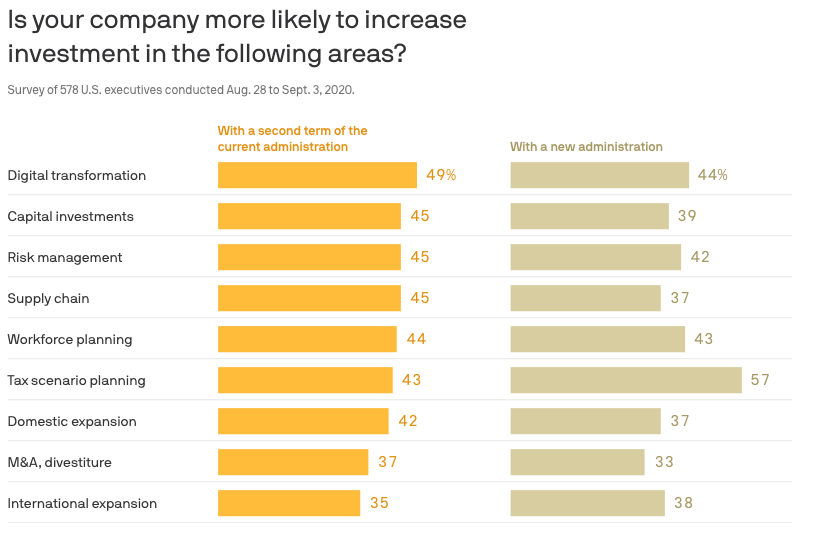
COVID and the New World Order
Dashboards: Great piece on COVID dashboards, but applicable more generally "Dashboards give us the illusion of control, but graphs and trendlines can also become a substitute for thought."
Gyms: New York Sports Club owner, Town Sports International filed for bankruptcy. This follows Gold’s Gym, Flywheel, 24-Hour Fitness, and countless other chains. Meanwhile Peloton stock is up is almost 5x since March.
IBM: IBM has a software tool for figuring out how to re-open your office. The tools “incorporate local health data and other signals to help bosses decide whether they can safely reopen a site,” and “an app assigns workers staggered arrival times and points them to desks or conference rooms that have been recently cleaned.” IBM had to build the tool for their own business, but they are also making it available for clients. Like Amazon’s “first-best customer” model.
GPT-3, AI and Machine Learning
Amazon: Amazon uses humans to train AIs to set prices. Once the human’s job is eliminated by algorithm, the human moves on to a new task. Their job is no longer, “set prices,” their job is “AI trainer,” which is not going away any time soon.
New Moores Law: Moores Law states that the number of transistors on an Integrated Circuit (IC) doubled every two years, or more practically the same dollar buys twice as much computing power every 18-months. It was originally coined in 1965, and has continued to be roughly correct ever since through multiple step-changes in technology. The new “Huang’s Law,” posits that “silicon chips that power artificial intelligence more than double in performance every two years”. In practice the performance of Nvidia’s leading AI-focused chips have more than doubled every YEAR since 2012, but perhaps best to be conservative given only 8-years of data.
Careers
Retail CMO: A really great role overseeing all of marketing (except creative) for a global multi-brand retailer. Role is based in the southeast. 7-figure compensation. ~$500MM marketing budget that will double or triple in the next couple of years. Most of that spend is in television now, and they need someone who has some experience in that world, but comes from more of a performance marketer mindset (i.e., a “Third Way” marketer”). If interested ping me directly with a resume and I will get you in touch.
Fun
Net Neutrality: US Net Neutrality expired two years ago. Many predicted disaster. Patrick Collison (CEO/Founder Stripe) asks if anyone has followed up on this? Crickets. Think about this next time the apocalypse is “predicted”
Music Streaming: The impact of streaming on song and song-title length from the always insightful Matthew Ball.
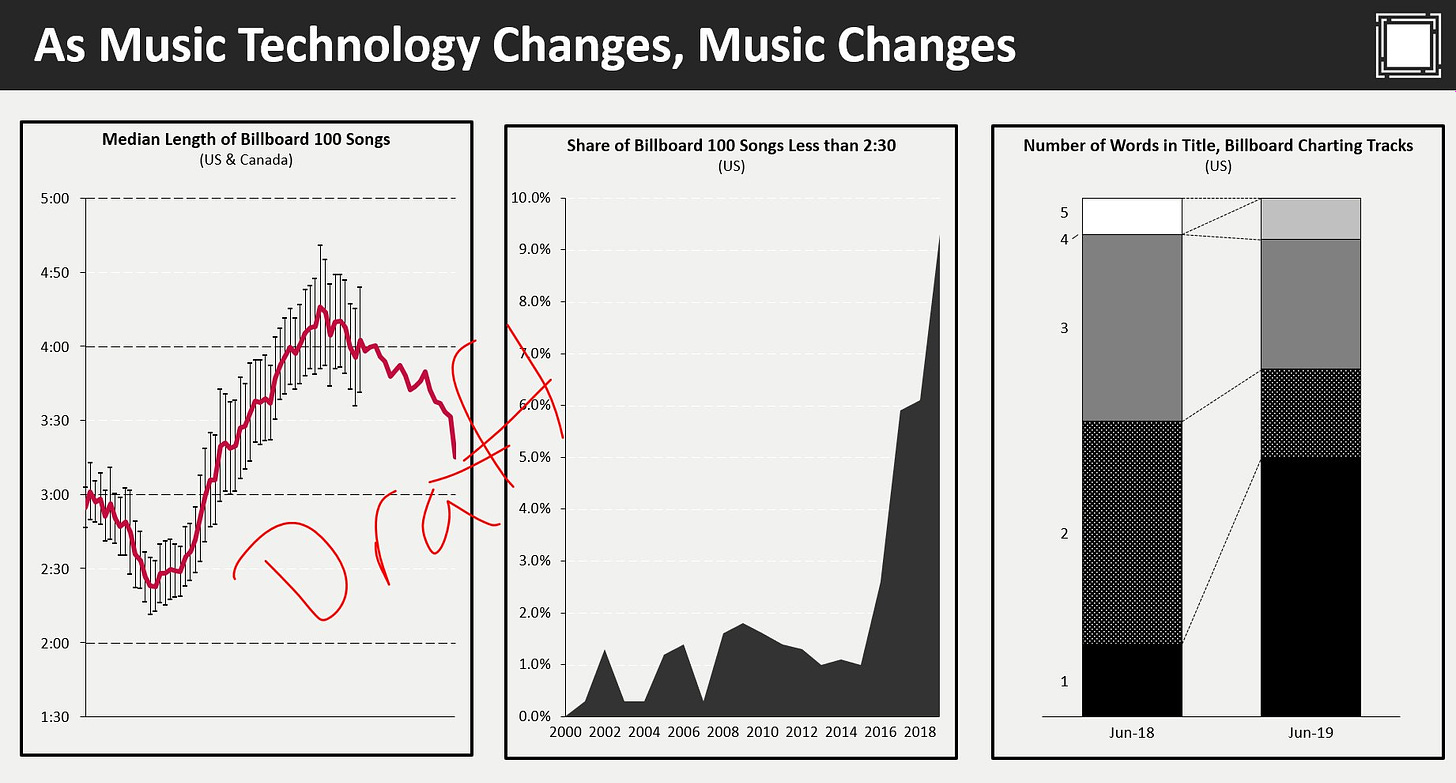
Keep it simple,
Edward


